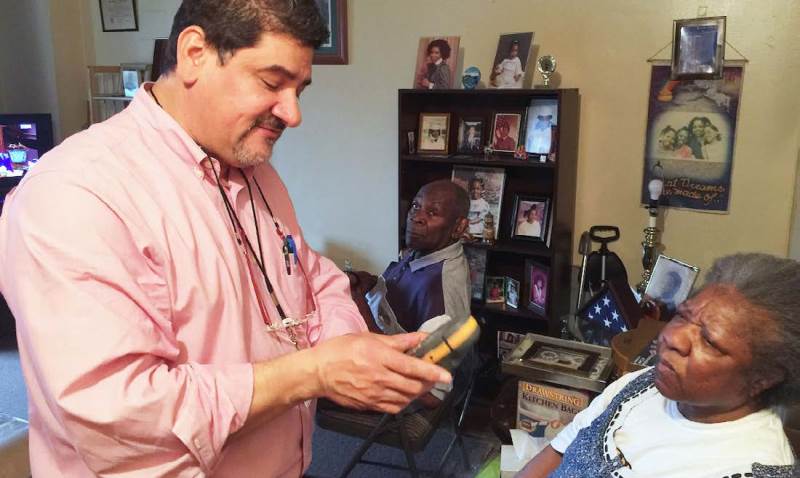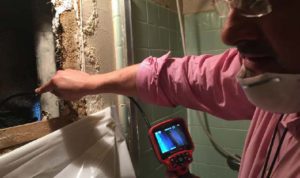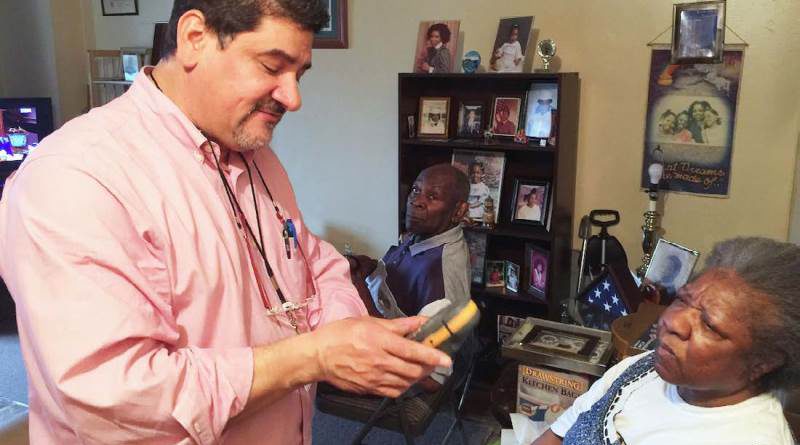NYCHA’s Comprehensive Mold Remediation Pilot

NYCHA launched a new pilot program to fight mold at 38 developments throughout the city on May 1, 2017. The year-long pilot, called Mold Busters, aggressively combats mold by empowering front-line staff with new training, tools, and protocols to permanently fix the source of the problem.
Developed in consultation with mold treatment experts, the program includes extensive training for property maintenance staff and provides new strategic remedies and protocols—including special work orders that require mold remediation jobs to be re-inspected to ensure that mold doesn’t return.
The training of 45 property maintenance supervisors, assistant property maintenance supervisors, skilled trades supervisors, and property managers during April and May included eight hours of classroom instruction in addition to field training at their developments.
Staff learned how to use a moisture meter, which differentiates between surface moisture, such as condensation, and moisture within the walls, which can indicate a leak. They were also trained to use anemometers to measure airflow from vents and hygrometers to measure humidity.
Along with new training, tools, and mold-killing paint, the program also includes a mold inspection protocol that creates a documented project plan for each mold work order. The plan guides staff through finding the root cause, determining next steps, and selecting appropriate remediation methods.
Uniquely Qualified
“Today’s training will give you the physical and analytical tools you need to remediate mold,” Professor Francis McGovern told staff at the May 4 training session. “Folks like you, on the ground, have the ability to solve this problem, and you care about the residents.”
Assigned as “special master” to oversee NYCHA’s mold remediation efforts through a court settlement several years ago, the Duke University professor of law asked mold remediation specialists at Microecologies, Inc., to help develop the mold remediation program.
“NYCHA’s employees are dedicated and highly skilled people who are uniquely qualified to solve the problem,” agreed Bill Sothern, an industrial hygienist with Microecologies. Eighty percent of mold recurrence problems “can be handled at the development level without requiring capital work,” he said.
“I think this program will work,” said Reid Apartments Property Manager Toshia Smith, who attended the class and the field training. “We’re not looking for a quick fix; we’re using the right equipment to find out what’s going on to remedy the situation.”
Ms. Smith described using a tool to measure air flow in bathroom vents and wall moisture; a micro inspection camera to look for leaks inside walls; and a device to measure air temperature at different locations. “My superintendent and I liked the equipment and so did the staff,” she said.
Drew Hamilton Property Maintenance Supervisor Gomillion McKinley said, “The equipment takes the guess work out of checking for moisture and mold. We could easily detect reduced air flow out of the vents, which could allow mold to grow. We also found a leak behind a wall without making lots of small holes to locate the source. This will definitely be a topic of conversation at morning muster and I’ll be training my staff.”
 Senior Advisor to the General Manager Shireen Riazi Kermani has been working on the mold initiative for the past two years. “We will test the new tools and procedures for one year at developments affecting 27,000 residents, look at the data on a monthly basis, and talk to staff to see how the pilot is going,” she said. The results of the pilot will then be used to modify the program before it’s launched throughout the Authority in 2018. “We’ve been working on this project for a long time,” said Ms. Kermani, “and we want to make sure we get it right.”
Senior Advisor to the General Manager Shireen Riazi Kermani has been working on the mold initiative for the past two years. “We will test the new tools and procedures for one year at developments affecting 27,000 residents, look at the data on a monthly basis, and talk to staff to see how the pilot is going,” she said. The results of the pilot will then be used to modify the program before it’s launched throughout the Authority in 2018. “We’ve been working on this project for a long time,” said Ms. Kermani, “and we want to make sure we get it right.”







